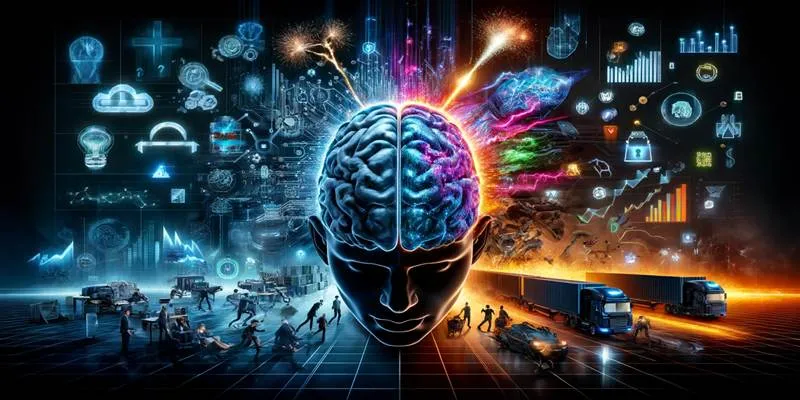In today's fast-paced world, productivity isn't just about working harder; it's about working smarter. To achieve this, businesses and professionals are increasingly relying on automation and artificial intelligence (AI). These tools are becoming essential for boosting productivity, reducing repetitive tasks, and streamlining daily operations.
From managing vast data sets to providing real-time customer support, AI and automation are revolutionizing the workplace. They not only enhance performance but also free up time for creativity, critical thinking, and strategic decision-making.
Understanding AI and Its Role in Boosting Productivity
Artificial Intelligence (AI) refers to computer systems designed to perform tasks that typically require human intelligence, such as decision-making, learning, and pattern recognition. AI systems can process large volumes of data and make decisions faster and more accurately than humans.
In the workplace, AI assists teams and individuals in making informed decisions, reducing manual errors, and optimizing resources. By analyzing substantial data sets, AI tools identify trends and recommend effective actions, saving time and increasing output.
Exploring Automation and Its Impact
Automation involves using software, machines, or systems to execute tasks with minimal human intervention. These tasks can range from sending emails to controlling entire production lines. While automation has been around for decades, its integration with AI has significantly enhanced its capabilities.
AI-powered automation now learns from past data, adapts to new information, and performs tasks with increased precision. This advancement allows businesses to automate complex processes that previously required continuous human supervision.
The Importance of Productivity in Today's Workplace

Productivity is the cornerstone of growth, profitability, and competitive advantage. Whether it's a startup, a large enterprise, or a freelancer, the ability to produce high-quality work efficiently is a universal objective.
AI and automation contribute to this goal by:
- Reducing time spent on repetitive tasks
- Enabling focus on strategic activities
- Minimizing errors that could lead to costly delays
By eliminating inefficiencies, these tools empower teams to concentrate on what truly matters—innovation and value creation.
Practical Applications of AI and Automation
AI and automation tools are applicable across various industries, including healthcare, marketing, finance, education, and manufacturing. Their adaptability allows them to be tailored to different roles and business requirements. Let's delve into how they enhance productivity in different areas.
Automating Repetitive and Time-Consuming Tasks
Many workplace hours are consumed by repetitive and low-value tasks, such as data entry, email responses, report generation, and scheduling. Automating these tasks saves employees hours each week, allowing them to focus on more impactful work.
Examples include:
- Email filtering and sorting: AI tools categorize and prioritize emails for quicker responses.
- Data entry automation: Software bots handle spreadsheets and databases with high accuracy.
- Appointment scheduling: AI assistants book meetings based on calendar availability.
These automations enhance consistency and reduce cognitive load.
Enhancing Decision-Making with AI Insights
AI can analyze thousands of data points in seconds, enabling faster, data-driven decisions that support long-term success. For example, AI can predict customer behavior, identify risks, and detect patterns that humans may overlook.
Use cases include:
- Marketing teams using AI to segment audiences and personalize campaigns.
- Financial firms using AI to assess investment risks or detect fraud.
- Retail businesses tracking purchase patterns to manage inventory.
Enhancing Customer Experience Through Automation
In today's customer-first environment, AI and automation are vital for delivering quick, consistent, and personalized service. AI chatbots and virtual assistants can handle multiple customer queries simultaneously, reducing wait times and boosting satisfaction.
Common tasks managed by AI in customer support:
- Providing order updates
- Answering product-related questions
- Troubleshooting common issues
- Booking services or appointments
This allows human agents to focus on complex cases while routine interactions are efficiently automated.
Promoting Better Team Collaboration
Remote and hybrid work models have increased the need for effective collaboration. AI tools help teams stay connected and aligned through smart task management, automated updates, and real-time communication. Platforms like Notion, Trello, or Slack use AI features to track deadlines, assign tasks, and send notifications, ensuring smoother collaboration.
Key collaboration benefits:
- Fewer missed deadlines
- Improved team accountability
- Clearer communication through automated updates
By keeping everyone on the same page, these tools reduce friction and encourage consistent progress.
Streamlining Personal Task Management
AI isn't just for businesses; individuals can also benefit from productivity tools that assist with personal organization.
Personal automation can include:
- Email sorting with AI filters
- Automatic to-do list creation
- Voice assistants scheduling events
- Apps analyzing time spent on tasks
These solutions help individuals build better habits and stay focused throughout the day.
Examples of Popular AI and Automation Tools

Some widely-used tools making a significant impact on productivity include:
- Grammarly: Improves writing using real-time AI suggestions
- Zapier: Connects different apps to automate workflows
- Asana: Offers task automation for team projects
- Google Calendar: Uses AI to suggest optimal meeting times
- Trello Automation: Adds rules and triggers to boards to reduce manual steps
These tools require minimal setup and are user-friendly, even for non-technical users.
Conclusion
AI and automation are transforming the way people work by making processes faster, smarter, and more efficient. These technologies reduce the time spent on repetitive tasks and minimize human error. They also support better decision-making through accurate data analysis, allowing teams to focus on meaningful work. From enhancing customer service to streamlining personal task management, their impact is extensive and practical. While challenges like cost and data privacy need attention, the overall benefits are undeniable. Businesses that adopt these tools gain a competitive edge and save valuable time.
 zfn9
zfn9























